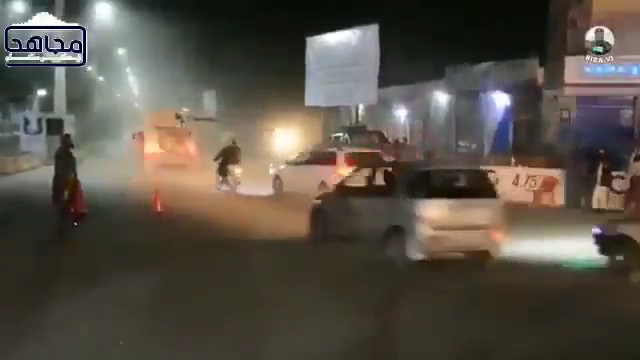THE Taliban has launched a wave of deadly cross-border attacks on Pakistani troops – triggering the fiercest escalation between the two sides in years.
Fighting erupted overnight along the volatile northern frontier across multiple mountainous regions.
War fears as reckless Taliban ‘plays game of fire & blood’ on Pakistan border after deadly clashes over airstrikesX
This may spark one one of the fiercest escalations between the two sides in years.X
Pakistani officials said their forces were responding “with full force” to what they called unprovoked firing from AfghanistanX
Both sides unleashed small arms and artillery fire in what the Taliban government described as “retaliatory operations”.
Casualties remain unclear, but the Taliban claims the strikes were in direct response to Pakistan allegedly bombing a civilian market inside Afghan territory on Thursday in a dramatic spike in tensions.
Pakistanis’s Interior Minister Mohsin Naqvi hit back furiously, branding the attacks “unprovoked” and warning that his country would respond “with a stone for every brick”.
Islamabad has long accused Kabul of harbouring militants who attack Pakistan from Afghan soil – claims the Taliban leadership has repeatedly denied.
Both Afghan and Pakistani forces reportedly exchanged fire across multiple flashpoints in the Kunar-kurram border region, according to the BBC.
Naqvi blasted the Taliban’s actions on X, saying he “strongly condemns” the strikes.
“The firing by Afghan forces on civilian populations is a blatant violation of international laws,” he said. “Afghanistan is playing a game of fire and blood.”
A Pakistani military spokesperson said they would take “necessary measures to safeguard Pakistani lives and properties”.
While the military has not yet issued a formal statement, a security source told the BBC that heavy firing broke out at several key locations across the border.
These locations include Angoor Adda, Najaur, Kurram, Dir, Chitral and Baramcha.
A police officer stationed near Zero Point in Kurram district described intense shelling beginning around 22:00 local time (17:00 GMT).
He said reports were flooding in of heavy gunfire from multiple sites.
The exchange of fire took place at more than six locations along the border, officials told AFP.
“This evening, Taliban forces began using weapons. We fired first light and then heavy artillery at four points along the border,” a senior official in Pakistan’s Khyber-Pakhtunkhwa province said.
Pakistan’s government did not confirm it was behind Thursday’s air strike, but called on Afghanistan to stop harbouring the Pakistani TalibanEPA
On Thursday, two explosions were heard in the Afghan capital Kabul and another in the south-east of the countryX
Pakistani forces hit back with heavy fire and shot down three Afghan quadcopters suspected of carrying explosives.
On Thursday, two explosions were heard in Kabul and another in the south-east.
The Taliban-run defence ministry blamed Pakistan for the blasts, accusing it of violating Afghan sovereignty.
“In retaliation for air strikes carried out by the Pakistani army on Kabul”, Taliban forces were engaged “in heavy clashes against Pakistani security forces in various areas” along the border, the Afghan military said.
Taliban defence ministry spokesperson Enayat Khowarazm told AFP the “successful” operations ended at midnight.
“If the opposing side violates Afghanistan’s territory again, our armed forces are ready to defend their territory and will respond firmly,” he said.
Pakistan’s government did not confirm it was behind the Thursday strikes but demanded Kabul “stop harbouring the Pakistani Taliban (TTP) on its soil.”
The TTP, trained in Afghanistan and ideologically aligned with the Afghan Taliban, has been blamed for hundreds of Pakistani troop deaths since 2021.
Pakistani Defence Minister Khawaja Muhammad Asif told parliament on Thursday that efforts to convince the Taliban to stop backing the TTP had failed.
“We will not tolerate this any longer,” he warned. “United, we must respond to those facilitating them, whether the hideouts are on our soil or Afghan soil.”
Earlier on Saturday, the TTP claimed responsibility for deadly attacks in north-west Pakistan that killed 20 security officials and three civilians.
The cross-border escalation comes just days after Afghanistan’s Taliban government accused Pakistan of violating its “sovereign territory”, after two loud explosions were heard in Kabul late on Thursday.
Pakistan, the Taliban said, bombed a civilian market in Paktika province in Afghanistan’s south-east.
Locals told BBC’s Afghan service that shops were destroyed in the strikes.
A top Pakistani general responded by accusing Afghanistan of being used as a “base of operation for terrorism against Pakistan”.
Islamabad has long claimed the Afghan Taliban allow the Pakistan Taliban, known as the TTP, to launch attacks against the Pakistani state in a bid to impose hardline Islamic rule. Kabul has always denied this.
The surge in violence coincides with Afghan Taliban Foreign Minister Amir Khan Muttaqi’s historic week-long visit to India, his first since the Taliban retook power.
In a major diplomatic move, Delhi announced it would reopen its embassy in Kabul, four years after shutting it.
Naqvi issued a stark threat to Kabul: “Afghanistan will also be given a befitting reply like India, so that it will not dare to look at Pakistan with a malicious eye.”
Saudi Arabia, which signed a mutual defence pact with Pakistan last month, called for “self-restraint and avoidance of escalation” between the two nations.
Qatar echoed the warning, urging both sides to “prioritise dialogue, diplomacy, and restraint” as the border crisis threatens to spiral further.
The next day, the Taliban-run defence ministry blamed the attacks on Pakistan, accusing its neighbour of violating its sovereigntyAFP
Pakistan’s government did not confirm that it was behind Thursday’s attacksX

